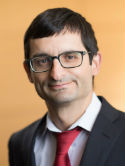Feasibility and safety of diffusing alpha-emitter radiation therapy for recurrent or unresectable skin cancers Journal Article
| Authors: | D'Andrea, M. A.; Vanderwalde, N. A.; Ballo, M. T.; Patra, P.; Cohen, G. N.; Damato, A. L.; Barker, C. A. |
| Article Title: | Feasibility and safety of diffusing alpha-emitter radiation therapy for recurrent or unresectable skin cancers |
| Abstract: | Importance: Patients with recurrent or unresectable skin cancers have limited treatment options. Diffusing alpha-emitter radiation therapy (DaRT), a novel solid tumor management strategy using alpha-particle interstitial brachytherapy, may address this challenge. Objective: To evaluate the feasibility and safety of using DaRT to manage recurrent or unresectable skin cancers. Design, Setting, and Participants: This prospective cohort study of patients who received a 2-week to 3-week treatment course and were followed up for 24 weeks after treatment during 2021 and 2022 at 2 sites in the US. Patients with malignant skin tumors or soft tissue tumors were recruited if they had limited treatment options for tumors recurrent after prior surgery or external beam radiotherapy or unresectable tumors. Intervention: Patients underwent DaRT to deliver a physical dose of 10 Gy (equivalent weighted dose of 200 CGE) to the tumor. Main Outcomes and Measures: Feasibility of the DaRT procedure was evaluated based on the ability of investigators to successfully deliver radiation to the tumor. Patients were followed up for adverse events (AEs) for 24 weeks and for tumor response by physicians' physical examination and imaging 12 weeks after device removal. Results: This study included 10 participants with recurrent or unresectable skin cancer (median [IQR] age, 72 [68-75] years; 6 males [60%]; 4 females [40%]). Six patients (60%) had recurrent disease, and 4 (40%) had tumors that were deemed unresectable. Tumors were located on the nose, chin, eyelid, scalp, neck, trunk, and extremities. Median (range) tumor volume before treatment was 2.1 cm3(0.65-12.65 cm3). The mean (SD) prescription dose coverage of the gross tumor volume was 91% (2.8%) with all tumors having coverage of 85% or more. No device-related grade 3 AEs were noted. Common AEs were grade 1 to 2 erythema, edema, and pruritus. At 12 weeks following treatment, there was a 100% complete response rate. Nine of 10 complete responses (90%) were confirmed by CT imaging. Conclusions and Relevance: This cohort study suggests the feasibility and preliminary safety of DaRT in the management of recurrent or unresectable skin cancers. The favorable safety profile and high response rates are promising. A US trial for marketing approval based on this pilot study is under way. Trial Registration: ClinicalTrials.gov Identifier: NCT04377360. © 2023 American Medical Association. All rights reserved. |
| Keywords: | adult; clinical article; controlled study; treatment response; aged; histopathology; cancer recurrence; squamous cell carcinoma; treatment duration; prospective study; prospective studies; edema; pain; cohort studies; basal cell carcinoma; skin neoplasms; tumor volume; radiotherapy dosage; skin cancer; cohort analysis; device removal; pruritus; prescription; skin tumor; feasibility study; pilot study; feasibility studies; pilot projects; erythema; brachytherapy; physical examination; inoperable cancer; external beam radiotherapy; wound infection; radioisotope therapy; soft tissue tumor; radiation dermatitis; gross tumor volume; clinical target volume; alpha radiation; clinical outcome; Common Terminology Criteria for Adverse Events; humans; human; male; female; article; x-ray computed tomography; diffusing alpha emitter radiation therapy |
| Journal Title: | JAMA Network Open |
| Volume: | 6 |
| Issue: | 5 |
| ISSN: | 2574-3805 |
| Publisher: | American Medical Association |
| Date Published: | 2023-05-01 |
| Start Page: | e2312824 |
| Language: | English |
| DOI: | 10.1001/jamanetworkopen.2023.12824 |
| PUBMED: | 37166798 |
| PROVIDER: | scopus |
| PMCID: | PMC10176125 |
| DOI/URL: | |
| Notes: | The MSK Cancer Center Support Grant (P30 CA008748) is acknowledged in the PubMed record and PDF. Corresponding author is MSK author Christopher A. Barker -- Source: Scopus |
Altmetric
Citation Impact
BMJ Impact Analytics
Related MSK Work






